f you are a music enthusiast and want to learn how to produce music or how to DJ, then you are more than likely looking for a school to attend for formal education regarding music. The problem is that there are so many schools of music production that are outdated and would fail to even contend for the title of best music schools in their surroundings. There is a huge number of unnecessary and time-wasting courses that are being taught in a plethora of music schools around the world.
Many students waste their time and money on such institutions when they could be efficiently and effectively learning actual music production. These schools teach you vague concepts and their practical application is barely satisfactory. They just stick to the course and their approach is not pragmatic. Similarly, they don’t like to test their students and are more inclined to just complete the semesters. To save you from such a situation, we have created a list of the best music production schools in the world that you can join and work on your music skills.
What Is Music Production?
Music production is the study of how to record music. The field includes the study of music itself as well as how to make use of computers and other technology to capture performances.
As a music production major, you could learn about different devices, such as different types of microphones and their sound qualities. You can also learn how to analyze artistic aspects of music, record music, and refine recordings through the editing process. Music production usually takes place in studios, but it could potentially be practiced anywhere with a phone or laptop.
The best schools for music production teach studio skills that can enable you to create your own recorded music. The study of music production blends both artistic and technical interests.
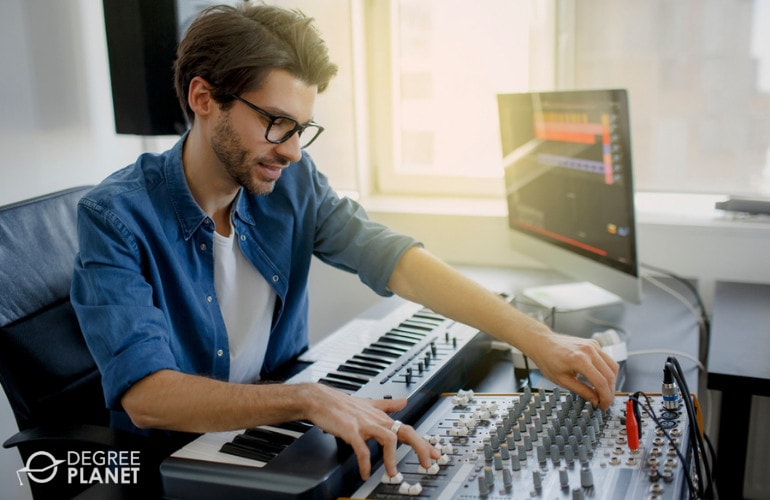
Knowledge of music production can be useful for musicians in educational and recreational settings. It’s also strategic for those who wish to pursue careers in the commercial music industry.
Read on to learn more about college majors and career prospects in music production.
Best Schools for Music Production

Majoring in music production is becoming more popular, and degrees in music production can take many forms.
A Bachelor of Arts in Music Production provides a strong foundation in core subjects and the humanities, while a Bachelor of Science emphasizes how the technology works. On the other hand, a Bachelor of Fine Arts will focus more on the artistic and performance aspects of music.
Topics studied in music production schools often include:
- Music theory
- History of recording and the commercial music industry
- Aural skills
- Keyboard skills
- Different genres of music
- Basic knowledge of recording equipment
- Hardware and software for recording and editing music
It is beneficial to screen and evaluate music production colleges to determine their credibility and to see which ones best align with your goals. Some schools may do a better job than others at providing the knowledge and experience you’re looking for.
A number of audio production schools offer degree programs both on campus and online. On-campus programs usually have studio labs where you can gain hands-on experience working with recording technology and equipment.
You may also be able to earn your degree in a hybrid format, having a combination of online and on-campus commitments. For some online music engineering schools, you may be expected to own your own recording equipment.
Music Production Careers & Salaries
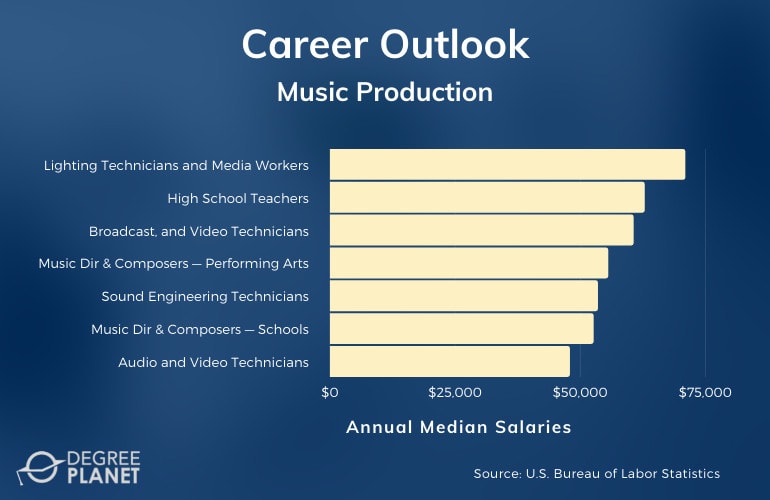
Music production training can be utilized in the commercial recording industry, but it can be applied to other settings as well.
For instance, churches and schools often need professionals who are knowledgeable about audio technology for services, recordings, events, or performances. According to the Bureau of Labor Statistics, here are some careers related to music production, along with their median annual salaries.
| Careers | Annual Median Salaries |
| Lighting Technicians and Media and Communication Equipment Workers | $73,460 |
| Music Directors and Composers — Elementary and Secondary Schools | $61,950 |
| High School Teachers | $61,820 |
| Broadcast, Sound, and Video Technicians — Motion Picture and Sound Recording Industries | $60,540 |
| Sound Engineering Technicians | $60,500 |
| Music Directors and Composers — Performing Arts Companies | $50,150 |
| Audio and Video Technicians | $48,820 |
| Music Directors and Composers — Religious, Grantmaking, Civic, Professional, and Similar Organizations | $48,420 |
| Broadcast Technicians | $44,740 |
| Broadcast, Sound, and Video Technicians — Radio and Television Broadcasting | $37,750 |
Music production knowledge can be useful in media and entertainment industries as well as in educational settings. Music directors and composers are usually employed by performing arts companies, elementary and secondary schools, or religious, grantmaking, civic, professional, and similar organizations. Many professionals are also self-employed.
Music Production Bachelor’s Curriculum & Courses

Here are examples of courses you might take while earning a bachelor’s degree in music production:
- Principles of Audio Technology: In this course, you’ll learn the basics of using various types of audio equipment.
- Critical Listening Lab: This course focuses on developing your skills in recognizing and paying attention to the details of how a piece of music sounds.
- Production Analysis Lab: In this course, you’ll learn to evaluate the emotional effectiveness of a recording.
- Audio and MIDI Systems for Music Production: In this course, you’ll learn about the Musical Instrument Digital Interface and how to connect computers, microphones, instruments, and other devices together for a recording session.
- Hybrid Production: In this course, you’ll learn how to use analog technology in conjunction with digital technology in the music studio.
- Creative Production Skills: In this course, you’ll study the artistic and soft skills needed to work as a music producer, such as collaborating with artists and clients to define the goals of a recording project and choosing vocalists and instrumentalists.
- Music Production for Records: In this course, you’ll learn about the process of creating a complete commercial record, such as choosing which songs to include and what order they should be in.
- Advanced Recording Techniques: In this course, you’ll learn complex ensemble microphone techniques and other advanced skills.
- The Business of Music Production: In this course, you’ll learn about legal and financial aspects of the music industry—including copyright, deal structures, client relationships, project planning, product distributions, and the collection and distribution of royalties.
- Advanced Production Projects: In this course, you’ll create your own recordings to demonstrate your knowledge and skills.
Exact course titles and requirements will vary at different schools.
How to Choose an Online School for Music Producing
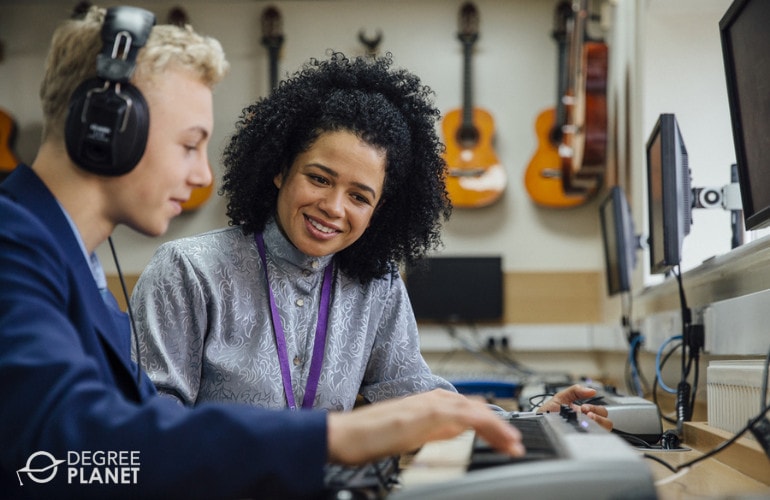
Here are some factors to consider when choosing an online school for music producing:
- Job placement rate. What have previous students done after graduation? How many have gone on to establish careers in music production or related fields? Has the school produced any notable alumni?
- Collaboration. Does the school offer opportunities to interact with classmates and instructors? Because the creation of music is often a team effort, you may want your student experience to include opportunities to work with other musicians and receive feedback from instructors. Even if a degree program is entirely online, it may still provide these opportunities via online platforms.
- Musical genre. Does the program focus on your preferred genre of music? You may want to find a program where the instructors and other students share similar musical interests.
You may want to research a lot of different schools and programs before choosing where to apply.
Music Production Major Admissions Requirements

Here are some common admissions requirements for bachelor’s degree programs in music production:
- High school diploma or GED
- Official high school transcripts
- Essays or personal statements
- Auditions or demo recordings
Some schools may also require SAT or ACT scores, but a growing number of schools are no longer requiring them. At some colleges and universities, applicants must first be accepted into the school as a whole. They then fill out a second application or go through an audition process to specifically become a music production major.
Colleges for Music Production Accreditation
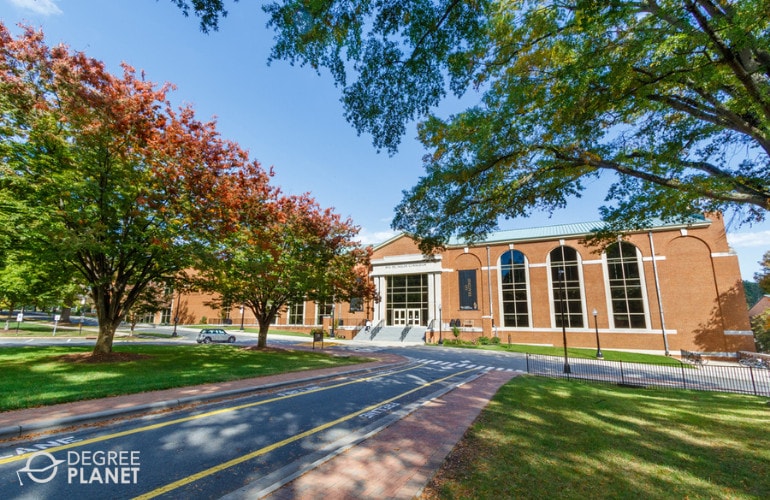
Before applying to any given college or university, you may want to find out if the school in question has regional accreditation.
Regionally accredited schools are regularly evaluated by their accrediting agencies to ensure that they meet certain basic standards in terms of their curricula, instruction, facilities, and more. Attending a regionally accredited school can be a qualifier for some forms of financial aid, and it can impact the transferability of your earned credits.
You can usually find out about a school’s accreditation status by checking their website. You can also learn more about regional accreditation in general by visiting the Council for Higher Education Accreditation (CHEA).
Financial Aid and Scholarships

As you plan to get your college degree, you might be concerned about how you will pay for it. There are many forms of financial aid available for prospective students who qualify, including online students.
You might qualify for state or federal financial aid, and schools often have grants or scholarships that they award to select students based on need or merit. Some employers also have programs to help their workers fund their education.
For many students, the first step to obtaining financial aid is to fill out the Free Application for Federal Student Aid (FAFSA).
What Is Music Production?
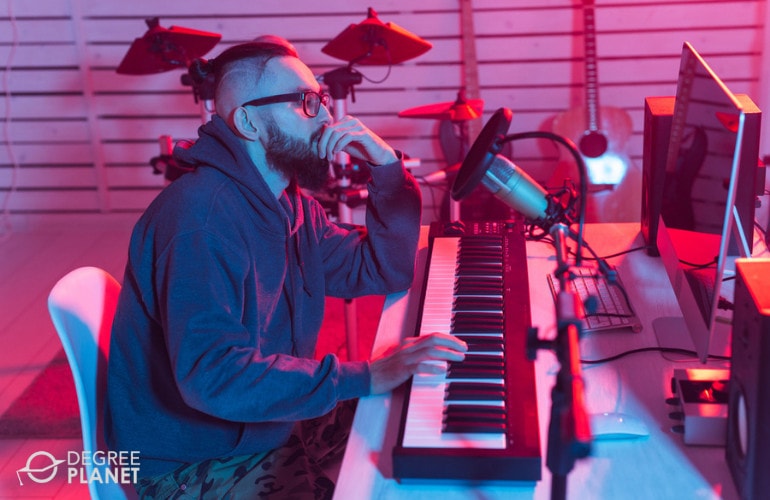
Music production is the study of how to record music. The field includes the study of music itself as well as how to make use of computers and other technology to capture performances.
As a music production major, you could learn about different devices, such as different types of microphones and their sound qualities. You can also learn how to analyze artistic aspects of music, record music, and refine recordings through the editing process. Music production usually takes place in studios, but it could potentially be practiced anywhere with a phone or laptop.
Is Music Production a Good Major?
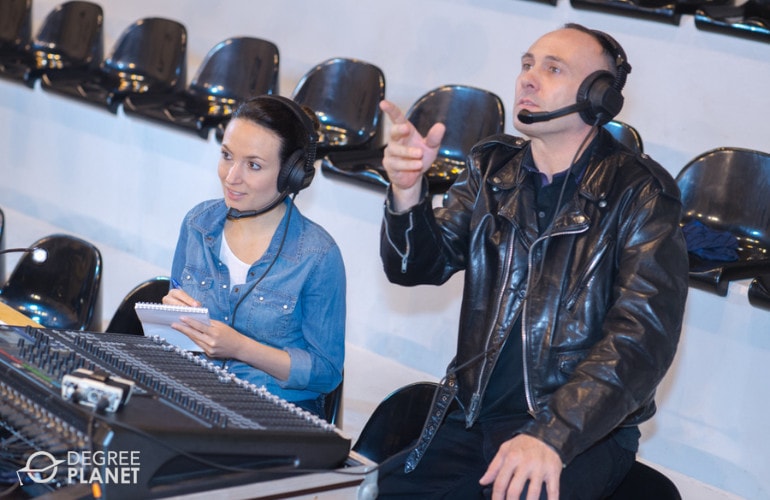
Yes, music production is a good career for many undergraduate students. Music production provides a creative outlet as well as opportunities to become skillful with a variety of different types of technology.
Career paths related to the field of music production include music directors and composers, musicians and singers, and sound engineering technicians. Employment of sound engineering technicians is currently projected to grow by 17% percent over the next decade, which is much faster than average (Bureau of Labor Statistics).
The music production field is competitive, and a music production major can be advantageous for students who are very passionate about the subject.
What Can You Do with a Music Production Degree?

While many music production graduates want to become commercial record producers or musicians, there are other opportunities in this field.
For instance, knowledge gained from a music production program could be useful for an audio technician who works at a studio or an event venue. Sound engineering is another common career path. Some professionals become music directors or instructors for schools, churches, or music conservatories.
Graduates who are interested in teaching music in a K-12 public school setting usually earn their music teacher certification, which can vary by state.
How Much Do Music Producers Make?

The Bureau of Labor Statistics reports that music directors and composers earn a median annual salary of $49,130, with most earning between $24,440 and $123,800.
The median salary for sound engineering technicians is $60,500, and the median for audio and video technicians is $48,820 (Bureau of Labor Statistics). Many music producers, musicians, and recording artists work on a freelance basis, so their earnings are subject to frequent fluctuations.
The specific salary that a person can earn in music and audio production careers can vary widely, depending on a number of factors. Common determining factors include work experience, chosen industry, employer, and geographic location.
What Do Music Producers Do?
Music producers oversee the process of recording music. In addition to being technologically and musically literate, they also need to be familiar with the business side of music. They are often responsible for ensuring that recordings are completed on time and within budget.
Music producers may have musicians perform a piece of music multiple times and then choose which takes will go on the final album. They can also make other types of artistic decisions, such as deciding which instrument should play a certain line of music or how much the volume should fluctuate at different intervals.
The 10 Best Music Production Colleges
The rise of the music production college grants aspirational students access to state of the art gear, hard won expertise and the ability to get a foothold in a competitive industry. But with so many institutions offering such diverse pathways, it’s more than a little beneficial to identify the major players…

Over the last three decades, there’s been an exponential surge in music production colleges. While many institutions, such as the prestigious SAE and Guildford’s ACM, have longstanding reputations as providers of industry-priming know how, armed with a huge array of technology and gear, others have risen in tandem with the growth of computer music making. While magazine sales have (sadly!) dwindled, websites, social media and – critically – YouTube are the readily accessible mediums which serve as the new disseminators of tutorial content for aspiring producers and musicians. But music production colleges offer so much more than passively taking in video content.
The best music production colleges, listed here, are staffed by experienced personnel, who’ve weathered more than a few in-studio storms in their time. Daily interactions with people who’ve lived the career that you yourself seek is fairly vital. So too, is the revolving door of guest speakers and masterclasses that colleges like BIMM and ICMP offer as a fixed element of their syllabuses. The opportunity to learn from this well of varied experience is just one selling point for those that may be thinking of a career behind the desk.
While focused study of skills, coupled with academic training in software, hardware, gear and theory are all core aspects of the courses offered by these colleges, the appealing idea of building out your own professional networks and establishing your own little black book of contacts is another major lure. While how much networking you undertake while studying is largely down to you, it’s undeniable that students stand a much better chance of forging new connections by attending a music production course than they do locked away in your bedroom.
With all this in mind, then, here’s ten of the UK’s most acclaimed destinations that should be on the shortlist of anyone eyeing up where to develop their, or their children’s, abilities
Founded back in 2001, BIMM has grown into a multifaceted, prestigious destination for aspiring producers and professional musicians over the ensuing 21 years. With a range of campuses which take in Brighton, Birmingham, London and wider Europe, and with the power to award degrees bestowed upon it in 2019, BIMM is among the world’s most esteemed music-learning institutions.
Students can choose between a BA (Hons) in Electronic Music Production or Music and Sound Production. There’s also the option to combine a course with other disciplines (such as music business, or songwriting) for a joint honours. There’s a range of optional additional modules and a high degree of connectivity to the wider industry via BIMM’s extensive European network. “BIMM’s Music Production courses are incredibly flexible and career-focussed.” Explains BIMM Institute Birmingham’s College Principal, Ant Greaves, “We know that the modern music industry is ever changing, so by creating and developing our courses in conjunction with the employers who will ultimately offer our students work, we aim to prepare our students for a sustainable career in Music Production.”

Formerly the School of Audio Engineering, SAE now offers a wide array of wider media courses including 3D Animation, Graphic Design and Video Game Design, yet SAE remains a byword for top-tier music production education. Founded by Tom Misner in Australia back in the 70s, SAE has blossomed into a world-spanning body, with the alumni from its East London campus reading like something of a who’s who of music industry figures. As with BIMM, SAE offer a degree in Audio Production, quality assured by the University of Hertfordshire, and with that, provides access to some exemplary gear in both SAE House and Bankstock Studios or at its Glasgow and Liverpool campuses.
Originating in Guildford, and expanding to London and Birmingham. ACM has been a wellspring of new talent since 1995, providing specialist programmes and degrees in Music Performance, Songwriting, Production and Business. It boasts specialist programmes for a range of performance styles and genres. A key benefit of study at ACM is its close connectivity with Metropolis Studios, within which you can easily gain valuable expertise while witnessing the wheels of daily professional life turn. Its Industry Link department keeps in close contact with students following graduation, assisting alumni in making the right career choices. Just ask former students Zomboy, Newton Faulkner or the mighty Ed Sheeran: all of which honed their craft at ACM.
It’s a name that still conjures gravitas, and since it opened up its training institute in 2015, Abbey Road has been a world-class destination to study music production and audio engineering, too. Though the chance to work within and around Abbey Road itself is certainly attractive (aside from attending workshops in the legendary studios, the Institute has its own bespoke live room and recording studio there), in summer 2021 the London campus of the Abbey Road Institute moved into Islington’s Angel Recording Studios – one of Adele’s former favourite places to record. The courses that the Abbey Road Institute offers are varied, and include a professional one year Advanced Diploma in Music Production and Sound Engineering, as well as at 5-month Advanced Diploma in Audio Post Production in Film and TV.
Once known as the Guitar Institute, the Institute of Contemporary Music Performance is a music production college that provides a multitude of courses, and has been delivering on its promise of being London’s leading music industry education provider for 30 years. Recently granted the power to award its own degrees, ICMP’s courses are intricate and industry-focused, aimed at priming students with the knowledge and acumen required for a career in the ever-active industry (impressively, 94% of graduates land in full-time employment or further education) The raft of industry talent currently serving as tutors is equally as notable, including songwriter Tim Elsenburg and former Ash guitarist Charlotte Hatherly.

Bristol has a storied legacy as a hotbed of electronic music talent, and the city’s dBs Institute is driven to ensure that the next generation of innovators are furnished with decades of experience-carved knowledge. With a stated purpose to effect positive social change through sound, dBs provides personalised support and focused teaching to its students, who can study a wealth of course types. With undergraduate and postgraduate degrees oriented around Electronic Music Production, Sound Engineering, Video Game Sound, Live Sound and a whole heap more. While its parent city’s spirit flows through the main campus, there’s now also a Plymouth campus and, opening later this year, a new facility in Manchester.
First opened as a studio in London back in 1994, and now a truly global learning enterprise, Point Blank provides music production academies in five countries, a platter of online courses and an intricate web of networking opportunities for its students. With a star-studded roster of alumni, including Claude VonStroke, Goldie and Gemma Cairney, Point Blank has a recognised standing as an exemplary institution. At Point Blank, you can study for either a professional course or a university degree, with the technical courses sitting hand-in-hand with the music industry-leaning. Already offering a notably solid online course canon before the pandemic, Point Blank has enhanced its remote offering to students unable to physically attend over the last two years, now offering web-based skills workshops, virtual masterclasses and wellbeing activities.
Aimed at 16-18 year olds, SoundSkool music industry college is a solid choice for young people who are keen to start building a career in the professional world of music, or develop their abilities for their own projects “SoundSkool is a Music Industry College and community, we work hard to make sure all that we teach is relevant in today’s music industry.” Explains SoundSkool Founder and CEO Simon Gordon, “We deliver RSL qualifications and we amend our units annually to tweak what went well, and what can be improved.” Based in London, the college offers Level 2 and 3 Diplomas in Music & Business, and also hosts outreach programs that aim to provide free workshops and courses across London’s housing estates, youth clubs, schools and charities. Priding itself on small class sizes and greater face-to-face time with its students than many other colleges, SoundSkool’s individually-nurturing ethos is one which we can very much get on board with. “We are also a very small institution and students like the sense of family that we create.” Continues Simon, “Alongside this, is a great alumni network of students that have gone on to make waves in the industry.”
Established in the centre of London in 2002, the London College of Creative Media provides a range of courses on music production and performance. Its cube-shaped HQ was built in 2017, and is known affectionately as ‘The Box’. Within it are a maze of recording studios, equipped with a huge amount of industry standard, top flight gear. The LCCM’s 12-month MMus in Music Production is particularly attractive, as the college equips students in both the technical expertise required to go far in the industry, as well as focused identity-nurturing to better hone student’s personal brand. It also regularly invites industry professionals to share their experiences with students.

Alternatively, if a real-life course at a real-life college doesn’t float your boat, or it’s easier for you to study remotely, you can always take a web-based course. In the online domain, here’s no better provider than Producertech. Allowing you to cherry pick and pay just for the courses you personally need, and then view and participate at home via your computer. Unlike the myriad diffuse videos you might find on YouTube, Producertech carefully curate their courses, with additional course materials including software projects, livestreams, assignments and a private forum for all members. While it’s a different kettle of fish from learning the ins and outs of music production at a college, Producertech is certainly worth listing for being one of the world’s best providers of online music production knowledge.
Music Production Careers & Salaries

Music production training can be utilized in the commercial recording industry, but it can be applied to other settings as well.
For instance, churches and schools often need professionals who are knowledgeable about audio technology for services, recordings, events, or performances. According to the Bureau of Labor Statistics, here are some careers related to music production, along with their median annual salaries.
| Careers | Annual Median Salaries |
| Lighting Technicians and Media and Communication Equipment Workers | $73,460 |
| Music Directors and Composers — Elementary and Secondary Schools | $61,950 |
| High School Teachers | $61,820 |
| Broadcast, Sound, and Video Technicians — Motion Picture and Sound Recording Industries | $60,540 |
| Sound Engineering Technicians | $60,500 |
| Music Directors and Composers — Performing Arts Companies | $50,150 |
| Audio and Video Technicians | $48,820 |
| Music Directors and Composers — Religious, Grantmaking, Civic, Professional, and Similar Organizations | $48,420 |
| Broadcast Technicians | $44,740 |
| Broadcast, Sound, and Video Technicians — Radio and Television Broadcasting | $37,750 |
Music production knowledge can be useful in media and entertainment industries as well as in educational settings. Music directors and composers are usually employed by performing arts companies, elementary and secondary schools, or religious, grantmaking, civic, professional, and similar organizations. Many professionals are also self-employed.
Music Production Bachelor’s Curriculum & Courses
Here are examples of courses you might take while earning a bachelor’s degree in music production:
- Principles of Audio Technology: In this course, you’ll learn the basics of using various types of audio equipment.
- Critical Listening Lab: This course focuses on developing your skills in recognizing and paying attention to the details of how a piece of music sounds.
- Production Analysis Lab: In this course, you’ll learn to evaluate the emotional effectiveness of a recording.
- Audio and MIDI Systems for Music Production: In this course, you’ll learn about the Musical Instrument Digital Interface and how to connect computers, microphones, instruments, and other devices together for a recording session.
- Hybrid Production: In this course, you’ll learn how to use analog technology in conjunction with digital technology in the music studio.
- Creative Production Skills: In this course, you’ll study the artistic and soft skills needed to work as a music producer, such as collaborating with artists and clients to define the goals of a recording project and choosing vocalists and instrumentalists.
- Music Production for Records: In this course, you’ll learn about the process of creating a complete commercial record, such as choosing which songs to include and what order they should be in.
- Advanced Recording Techniques: In this course, you’ll learn complex ensemble microphone techniques and other advanced skills.
- The Business of Music Production: In this course, you’ll learn about legal and financial aspects of the music industry—including copyright, deal structures, client relationships, project planning, product distributions, and the collection and distribution of royalties.
- Advanced Production Projects: In this course, you’ll create your own recordings to demonstrate your knowledge and skills.
How to Choose an Online School for Music Producing
Here are some factors to consider when choosing an online school for music producing:
- Job placement rate. What have previous students done after graduation? How many have gone on to establish careers in music production or related fields? Has the school produced any notable alumni?
- Collaboration. Does the school offer opportunities to interact with classmates and instructors? Because the creation of music is often a team effort, you may want your student experience to include opportunities to work with other musicians and receive feedback from instructors. Even if a degree program is entirely online, it may still provide these opportunities via online platforms.
- Musical genre. Does the program focus on your preferred genre of music? You may want to find a program where the instructors and other students share similar musical interests.
You may want to research a lot of different schools and programs before choosing where to apply.
Music Production Major Admissions Requirements
Here are some common admissions requirements for bachelor’s degree programs in music production:
- High school diploma or GED
- Official high school transcripts
- Essays or personal statements
- Auditions or demo recordings
Some schools may also require SAT or ACT scores, but a growing number of schools are no longer requiring them. At some colleges and universities, applicants must first be accepted into the school as a whole. They then fill out a second application or go through an audition process to specifically become a music production major.
Colleges for Music Production Accreditation

Before applying to any given college or university, you may want to find out if the school in question has regional accreditation.
Regionally accredited schools are regularly evaluated by their accrediting agencies to ensure that they meet certain basic standards in terms of their curricula, instruction, facilities, and more. Attending a regionally accredited school can be a qualifier for some forms of financial aid, and it can impact the transferability of your earned credits.
You can usually find out about a school’s accreditation status by checking their website. You can also learn more about regional accreditation in general by visiting the Council for Higher Education Accreditation (CHEA)
Leave a Reply